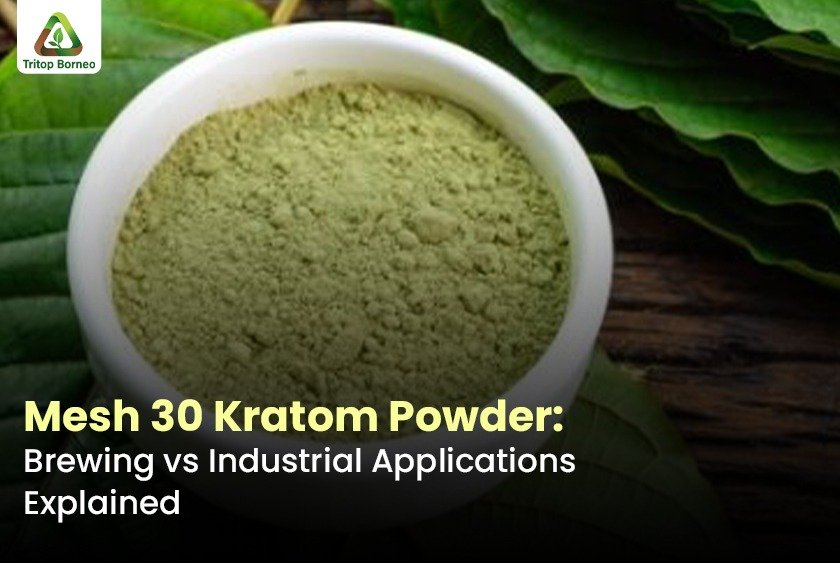Mesh 30 Kratom Powder: Brewing vs Industrial Applications Explained

Ever felt like your kratom isn’t delivering the same experience every time—even when the strain and vendor haven’t changed?
You’re not alone.
There’s a missing link most kratom users and even large-scale buyers overlook: mesh size.
Whether you're a home herbalist looking to brew the perfect cup or a supplement manufacturer trying to meet FDA-grade consistency, the mesh size of your kratom powder plays a bigger role than you think.
And if you’ve heard about Mesh 30 kratom, it’s time to understand why it's becoming the go-to benchmark for both brewing and industrial-grade formulations.
What Even Is Mesh 30, and Why Should You Care?
Let’s break it down without making it sound like a science lecture.
“Mesh” simply refers to how finely the kratom leaves have been ground—measured by the number of holes per linear inch in a screen. So, Mesh 30 means the powder passed through a screen with 30 holes per inch.
Now here’s the part nobody tells you—mesh size influences more than just texture.
It decides how quickly your tea brews, how evenly your capsules fill, how clean your powder looks, and even how well your brand passes customs inspections in strict regulatory markets.
The difference between coarse vs fine kratom powder isn’t just cosmetic. It’s functional.
Brew Better or Brew Bitter? Why Mesh 30 Changes the Game
So, what’s the best kratom mesh size for brewing?
Let’s imagine two users: One using Mesh 18 (much coarser), the other using Mesh 30. The first brews for 45 minutes to get a half-decent alkaloid profile. The second? Extracts 23% more mitragynine in just 15 minutes—with a cleaner, richer taste and almost zero sediment after filtering.
See the point?
Kratom for extraction and brewing is most efficient when the powder is fine enough to release alkaloids but not so fine it turns into sludge.
Mesh 30 walks that line perfectly.
It’s faster. Cleaner. And more potent when brewed correctly.
Capsule Consistency Starts With Mesh Consistency
Now let’s step into the lab.
Formulation teams don’t just grab kratom and stuff it into capsules. They run test batches. They check flow rate, clumping risk, static interference. They obsess over every variable that affects product quality at scale.
Mesh size for kratom capsules is a non-negotiable in this world.
Mesh 30 hits the sweet spot—fine enough for high-speed capsule machines to dose accurately, but dense enough to avoid spillage, compaction, or air-pocket formation.
In fact, many U.S. supplement brands have mandated Mesh 30 as the starting spec for new formulations to ensure GMP compliance. One variable down. Thousands of capsules saved.
When You’re Scaling Big, Mesh 30 Just Makes Sense
Alright, here’s where things shift from personal preference to industrial precision.
Bulk suppliers, extraction companies, beverage manufacturers—these folks don’t gamble on variability. They don’t just need kratom. They need repeatable, measurable output.
This is where kratom powder manufacturing applications demand Mesh 30.
A case study:
A European supplement firm sourcing from Southeast Asia ran into massive inconsistency problems using mixed mesh powder. Potency variance? 12%. Failed EU compliance? Twice in one year.
They switched to Mesh 30 exclusively.
Result? Potency deviation dropped to 2.9%, machine flow improved, and their COAs started showing consistent alkaloid yields batch after batch. Their supplier didn’t just provide powder. They provided a standard.
If you’re eyeing long-term industrial kratom supply, Mesh 30 isn’t optional. It’s essential.
Coarse vs Fine: Let’s Settle This Once and for All
This debate is older than most vendors.
Let’s simplify:
- Coarse powder (Mesh 18 or lower) is better for traditional brews or toss-and-wash. But it's less efficient for extraction, unpredictable in flow, and harder to standardize.
- Ultra-fine powder (Mesh 40+) may release more alkaloids—but also risks moisture retention, static build-up, and clogs machinery.
So what's the middle path?
Mesh 30 kratom for extraction and brewing balances both outcomes—fine enough to extract well, stable enough to handle and scale.
You're not sacrificing brew quality, and you’re not risking manufacturing chaos either.
What’s Happening in the Industry Right Now? (You Might Be Surprised)
Over the last two years, the kratom market has shifted dramatically.
Why?
Because more companies are moving from mom-and-pop packaging to regulated, supplement-grade production models. That means more demand for consistent, particle-size controlled powder.
Here's what's trending:
- Supplement brands are demanding Mesh 30 for standardized extraction and encapsulation
- Regulatory markets (especially in North America and the EU) are pushing for full traceability and mesh size verification on COAs
- Modern exporters are investing in custom milling equipment that produces 90%+ Mesh 30 uniformity, batch after batch
In short, the future belongs to suppliers who can offer precision milled kratom, not just leaf powder.
Three Interesting Facts That Might Just Shift Your Perspective
- Over 70% of U.S. kratom capsule brands now require Mesh 30 or finer to comply with GMP standards.
- Mesh 30 enables 30–40% faster extraction times compared to Mesh 18 in both water- and alcohol-based solvents.
- High-volume capsule machines see up to 50% fewer clogs when switching from Mesh 20 to Mesh 30 kratom powder.
The Takeaway: Why Mesh 30 Isn’t Just a Technical Choice
Let’s circle back to you—what are you really buying when you source kratom powder?
You’re buying a promise of consistency. You’re trusting that every batch delivers the same performance—whether it ends up in a teacup, capsule, or tincture bottle.
And that promise only holds if your powder holds up.
Mesh 30 isn’t just about powder size—it’s about supply chain maturity, lab-verified alkaloid delivery, and global-standard compliance.
That’s the kind of kratom offered by a supplier whose roots run deep—not just into soil, but into integrity and process.
One such supplier is Tribeka (Tritop Borneo)—a name you’ll only hear at the end of this article because the value they deliver speaks louder than branding.
Born in Borneo, built on transparency, and trusted worldwide—Tribeka isn’t just supplying kratom. They’re setting the standard.
